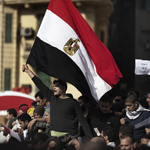Source: February 3
 The Egyptian newspaper Ash-Shorouk published on February 3 two statements released by a committee of pro-democracy activists involved in negotiating with the authorities a way to move from the present confrontation to a peaceful transition.
The Egyptian newspaper Ash-Shorouk published on February 3 two statements released by a committee of pro-democracy activists involved in negotiating with the authorities a way to move from the present confrontation to a peaceful transition.
In view of the high level of interest in the events in Egypt, the Carnegie Endowment for International Peace offers its readers this unofficial translation of the statements issued by the committee, which have not appeared in English so far. The Carnegie Endowment does not endorse the statements but believes they are of sufficient interest to be shared.
Full text of statement (translated from Arabic by the Carnegie Endowment for International Peace)
The current regime, represented by the president of the republic, has agreed to a limited number of the popular demands that have been clearly expressed. The people who have come out in the millions in Cairo and all Egyptian cities still insist on the following legitimate demands:
- The President must delegate to his Vice President the responsibilities of managing the transitional period that began yesterday and will be completed by the end of the president’s current term.
- The Vice President must agree to the following: dissolve the Shura Council and People’s Assembly and form a legislative committee consisting of constitutional experts and independent judges who will prepare for the necessary constitutional amendments.
- Form a government of experts and independent figures that are accepted by the public to administer executive operations during this transitional period.
- End the rule by Emergency Law and create specific mechanisms to hold accountable those responsible for attacks on the people as well as public and private property and for unprecedented intimidation of the public. Those in the various state institutions who contributed to exposing the nation and the public to the effects of this absence of security must also be held responsible.
- Ensure the safety of the youth that have congregated in Tahrir Square and other streets in Cairo and various Egyptian cities during this transitional period, and protect them from prosecution, persecution and violation of their rights. Their rights, including freedom of expression and peaceful assembly and their legitimate means of expression, must be protected. We note our full solidarity with the youth and call on all signatories of this statement to protect the protesters and their personal safety.
- We assert on record our appreciation and praise of the responsible, patriotic role of the military.
The signatories released a second statement stating:
The group, which addressed its message to the President, his deputy and the military proposed a way out of the grave crisis that has plagued the country and its citizens. The group reiterates its call for the military to ensure the security and safety of the Egyptian youth that is protesting peacefully in Tahrir Square and other streets in Egyptian cities, and to protect them from the risk of prosecution, persecution, and violation of their rights. The violence occurring on Egyptian streets will only contribute to more political tensions and create obstacles to mitigating the current crisis. We are hoping once again that the Egyptian military will help the nation and the people to emerge from this crisis and save the lives of the Egyptian youth.
Signatories:
Ahmed Kamal Aboul Magd
Naguib Sawiris
Nabil al-Arabi
Salama Ahmed Salama
Ibrahim El Moallem
Waheed Abd El-Majeed
Abdel Aziz El-Shafei
Amr Hamzawy
Amr El Shobaki
Gamil Matar
Safwat Thabet
Nabil Fahmy
Mervat el-Talawi
Ali Mosharrafa
Adel el-Moalem
Yahya al-Jamal
Anis Aclimandos
Amin Mahdy
Ahmed Fouad
Sami Mahmoud Zein el-Din
Amani Al Khayat
Nasser Amin
Fathi al-Shawadfi






